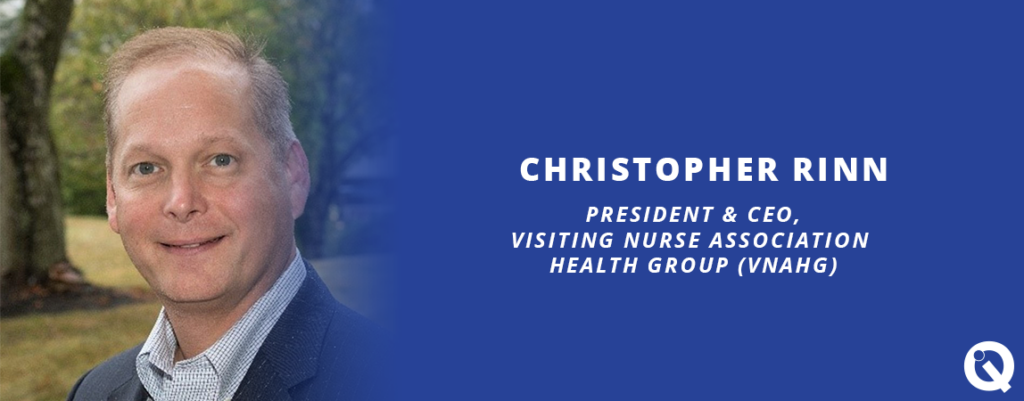Christopher Rinn, President and CEO of Visiting Nurse Association Health Group (VNAHG), a non-profit provider of home health, hospice, palliative and community-based care.
You recently took over as President and CEO. Can you name your top priority for the organization?
Coming out of a pandemic, we are now facing a new “health care norm.” Our workforce has been through one of the most challenging times in the last 100 years in health care and public health. My priority since my first day on the job has been to stay focused on the mission of our organization: empowering individuals and families to live their best lives. Whether it’s in our prenatal programs at the community health centers, or our hospice program at the end of life, we cover the full spectrum. I am also laser-focused on our people, our workforce — our most valuable and treasured resource in health care and VNAHG.
You previously led the organization’s Community Health Center, Inc., a federally qualified health center with four locations in Monmouth County, including one in Asbury Park. What did you learn in that role that you will bring to the larger mission?
That work reaffirmed to me that all health care is local. It starts in the communities that we serve. Understanding the community — as a citizen, not as a tourist — is essential. It is about learning and being involved in all the various aspects of a community. We need to be invested in and partner with our communities. It is ensuring that you expand access to care and overcome the barriers that impede access. Challenges exist around social determinants of health, and figuring out ways to overcome those challenges is an important lesson I take away from my work at the community health centers.
How is Visiting Nurse Association Health Group creating a robust and diverse work force at a time when there are shortages of nurses and other health care professionals?
Pre-pandemic, we had a workforce shortage, and there were challenges in terms of educating nurses with limited clinical sites available. This has only been exacerbated by the pandemic, but we’re taking proactive steps to build a robust and diverse workforce, not just through our recruitment strategies—which I think are the standard—but by providing unique opportunities to climb career ladders. An entry-level home health aide, for example, could advance his or her education to a licensed practical nurse or an RN. When we give people an opportunity to not just come to the VNA for a job, but really come to us for a rewarding career, that gives them an opportunity to develop a deeper commitment—not just to our organization, but to our patients and our community.
Your organization has worked closely with the Quality Institute on critical initiatives such as Conversation of Your Life (COYL). How does this work advance your mission?
Our partnership with the Quality Institute is a cornerstone of our work. Conversation of Your Live, for example, educates and empowers our community members to communicate their care preferences and to choose their health care proxies. It is core to our mission of helping individuals and their families achieve their best level of well-being.
There is a stigma around end-of-life choices and end-of-life care, particularly hospice. We can empower people to understand they have a choice to live out their best years and the time they have left with the best possible level of well-being. Conversation of Your Life ties directly with our focus on providing compassionate, coordinated, and high-quality innovative care at all stages of life.
Finally, we like to ask a question beyond a person’s professional work. Can you tell us who your favorite New Jersey artist is, i.e., singer, writer, actor?
I have lived in Monmouth County for most of my life, so there is a special place in my heart for Bruce Springsteen’s music and storytelling. But if you took Bruce Springsteen off the table, I would have to name the artist Winslow Homer. One of his most famous paintings is “Long Branch, New Jersey,” and it’s extraordinary.

